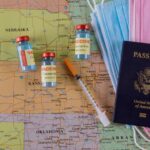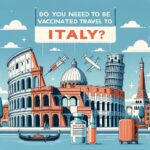Can you travel to Italy if you are vaccinated? As the world continues to navigate through the COVID-19 pandemic, many individuals who have been vaccinated are eager to resume travel. Italy, a popular destination for tourists, has implemented specific travel restrictions and requirements for those who have been vaccinated.
Italy’s current travel restrictions and requirements for vaccinated travelers are essential to understand before planning a trip. This article will provide an overview of Italy’s vaccine requirements, the process of proving vaccination status for entry into the country, accepted vaccines for entry, any additional requirements for vaccinated travelers, tips for planning a trip after vaccination, and recent updates on Italy’s travel restrictions related to vaccination.
It is important to stay informed about the latest regulations and guidelines to ensure a smooth and safe travel experience when visiting Italy. Whether you are a seasoned traveler or planning your first trip post-vaccination, knowing Italy’s current travel policies is crucial for a successful journey.
Overview of Italy’s Vaccine Requirements for Travelers
Italy has implemented strict travel restrictions in response to the COVID-19 pandemic, but there is hope for vaccinated travelers. The country has recently updated its rules, allowing vaccinated individuals to enter Italy under certain conditions. Here’s an overview of Italy’s vaccine requirements for travelers.
To enter Italy, vaccinated travelers must provide proof of vaccination. This can be in the form of a digital COVID-19 vaccination certificate or a paper vaccination card. Additionally, travelers must also complete a Passenger Locator Form before entering the country.
Accepted vaccines for entry into Italy include those authorized by the European Medicines Agency (EMA) or recognized by the World Health Organization (WHO). Currently accepted vaccines include Pfizer-BioNTech, Moderna, AstraZeneca, and Johnson & Johnson.
In addition to proof of vaccination, travelers must also adhere to any additional requirements set forth by Italian authorities. These may include testing upon arrival, quarantine measures, or health screenings at the airport. It’s important for vaccinated travelers to stay informed about these additional requirements as they plan their trip to Italy.
Overall, while there is hope for vaccinated individuals looking to travel to Italy, it’s important to stay updated on any recent changes in the country’s travel restrictions and entry requirements. As more people around the world become vaccinated, it is likely that Italy’s policies regarding vaccinated travelers will continue to evolve.
The Process of Proving Vaccination Status for Entry Into Italy
Italy’s Requirements
Travelers who have been fully vaccinated against COVID-19 can enter Italy for tourism and visiting purposes without the need to quarantine. The Italian government recognizes the importance of vaccination in controlling the spread of the virus and has therefore updated its travel restrictions to accommodate vaccinated individuals.
Demonstrating Vaccination Status
To prove vaccination status, travelers must present a digital or paper certificate showing that they have been fully vaccinated with an approved vaccine. This proof should include details such as the individual’s name, date of birth, dates of vaccination, and type of vaccine received. It is important to ensure that this documentation meets the requirements set by the Italian government in order to avoid any issues upon arrival.
Accepted Forms of Proof
Accepted forms of proof for demonstrating vaccination status include the EU Digital COVID Certificate, CDC COVID-19 Vaccination Record Card, or other official documentation from the country where the individual was vaccinated. It is essential for travelers to verify that their vaccination certificate meets Italy’s specific requirements before embarking on their trip.
Overall, being vaccinated against COVID-19 opens up opportunities for travel to Italy without the need for quarantine or strict testing protocols. As Italy continues to monitor and manage its travel policies in response to the pandemic, it is advisable for travelers to stay informed about any updates or changes that may affect their plans.
List of Accepted Vaccines for Entry Into Italy
When planning a trip to Italy, it is important to be aware of the accepted vaccines for entry into the country. As of the latest updates, Italy has specified a list of approved vaccines for travelers who are vaccinated. It is essential to check whether your vaccine is included in this list before making any travel plans.
Accepted Vaccines
The Italian government has approved several vaccines for entry into the country, including but not limited to Pfizer-BioNTech, Moderna, Johnson & Johnson, AstraZeneca, and Sinovac-CoronaVac. Travelers who have been fully vaccinated with any of these approved vaccines can travel to Italy without having to quarantine upon arrival.
However, it is crucial to ensure that you have received all recommended doses of the vaccine according to the manufacturer’s guidelines and that the final dose was administered within a specified timeframe before your planned travel date.
Unapproved Vaccines
It is important to note that there are certain vaccines that are not currently recognized by Italy for entry into the country. If you have been vaccinated with a vaccine that is not on the approved list, it is advisable to stay updated on any changes in Italy’s policies regarding accepted vaccines.
Travelers who have received unapproved vaccines may be subject to additional testing or quarantine requirements upon arrival, so it is essential to consider this when planning a trip to Italy after vaccination.
Traveler Responsibilities
As a responsible traveler, it is your responsibility to ensure that you comply with Italy’s vaccine requirements and provide accurate documentation of your vaccination status when entering the country. Be sure to carry your official vaccination certificate or card with you and keep it easily accessible during your travels. Additionally, it may be beneficial to have digital copies or backups of your vaccination proof in case it is required at various checkpoints during your journey.
Exploring Any Additional Requirements for Vaccinated Travelers
Italy has recently updated its travel restrictions for vaccinated individuals, allowing them to enter the country under certain conditions. If you are fully vaccinated against COVID-19, you can travel to Italy without the need to quarantine upon arrival. However, there are still some additional requirements that vaccinated travelers must meet before entering the country.
One of the key requirements for vaccinated travelers entering Italy is to provide proof of vaccination. This typically includes presenting an official vaccination certificate or passport with evidence of full vaccination. It is important to ensure that this documentation meets Italy’s specific requirements, such as displaying the type of vaccine received and the date of administration.
In addition to providing proof of vaccination, travelers must also complete a digital passenger locator form before arriving in Italy. This form collects essential information about your trip, including your contact details and place of stay while in Italy. It is recommended to complete this form well in advance of your travel dates to avoid any delays or complications upon arrival.
Furthermore, it is essential for vaccinated travelers to stay updated on any changes or updates to Italy’s travel restrictions, as the situation regarding international travel can rapidly evolve. Staying informed about entry requirements and potential changes in policies can help ensure a smooth and hassle-free travel experience when visiting Italy after being vaccinated.
| Requirement | Description |
|---|---|
| Proof of Vaccination | Official vaccination certificate or passport showing full vaccination status |
| Digital Passenger Locator Form | Required for providing essential trip information prior to arrival in Italy |
Tips for Travelers Planning a Trip to Italy After Vaccination
Italy is an incredibly popular travel destination and many people are wondering if they can travel to Italy if they are vaccinated. The good news is that Italy has recently updated its travel policies to allow entry for vaccinated individuals from certain countries. This means that if you are fully vaccinated, you may be able to visit Italy for leisure or tourism.
As of the time of writing, Italy requires travelers from certain countries to present proof of vaccination in order to enter the country. This is a part of the Italian government’s efforts to reopen its borders while still prioritizing public health and safety. It’s important to note that the specific requirements and accepted vaccines may vary depending on your country of origin, so it’s crucial to stay updated on the latest regulations before planning your trip.
To prove your vaccination status for entry into Italy, you will typically need to provide documentation such as a vaccine certificate or card issued by your local or national health authorities. This documentation should include details such as the type of vaccine received, the dates of administration, and your personal information. Some travelers may also be required to present a negative COVID-19 test result taken within a certain timeframe before their arrival in Italy.
| Vaccine Name | Manufacturer |
|---|---|
| Pfizer-BioNTech | Pfizer, Inc./BioNTech SE |
| Moderna | Moderna, Inc. |
| AstraZeneca | AstraZeneca/University of Oxford |
In addition to providing proof of vaccination, vaccinated travelers may also need to adhere to other entry requirements such as completing a digital passenger locator form and undergoing health screenings upon arrival in Italy. It’s important to review all necessary steps and procedures prior to your trip in order to ensure a smooth and hassle-free experience when traveling to Italy after being vaccinated.
Recent Updates on Italy’s Travel Restrictions Related to Vaccination
Italy has recently updated its travel restrictions related to vaccination, allowing vaccinated individuals to enter the country under certain conditions. This is welcome news for many travelers who have been eagerly awaiting the opportunity to visit Italy after being vaccinated against COVID-19. Here are some important updates regarding Italy’s travel restrictions for vaccinated individuals:
Recent Updates on Italy’s Travel Restrictions Related to Vaccination
- Acceptance of Vaccination: Italy now recognizes the vaccination status of travelers as a determining factor for entry into the country. Those who have been fully vaccinated with an approved vaccine can now travel to Italy without the need for quarantine or testing, depending on their country of origin.
- Eligible Vaccines: The Italian government has provided a list of accepted vaccines for entry into the country. It is important for travelers to ensure that they have received one of these approved vaccinations in order to be eligible for entry without quarantine or testing requirements.
- Vaccination Documentation: Travelers must be able to provide proof of their vaccination status in order to enter Italy. This may include showing a digital or physical copy of their vaccination certificate, which should display details such as the type of vaccine received, date(s) of vaccination, and other pertinent information.
These recent updates provide valuable insight into Italy’s current travel policies for vaccinated individuals. It is important for travelers to stay informed about any changes or developments in these policies as they plan their trips to Italy. By adhering to the requirements set forth by Italian authorities, vaccinated travelers can look forward to enjoying all that this beautiful country has to offer without unnecessary complications or delays.
Conclusion
In conclusion, the current travel restrictions in Italy have been primarily focused on controlling the spread of COVID-19 and protecting public health. As part of these efforts, the country has implemented specific requirements for travelers, including those who have been vaccinated. While Italy does allow vaccinated individuals to enter the country for tourism or other reasons, there are certain guidelines that must be followed.
The process of proving vaccination status for entry into Italy involves providing documentation such as a vaccine certificate or digital health pass. It is important for travelers to ensure that they have the necessary proof of vaccination before making plans to visit Italy. Additionally, it’s essential to carefully review the list of accepted vaccines for entry into Italy to confirm eligibility.
Looking ahead, it’s possible that Italy may make adjustments to its travel policies for vaccinated individuals based on the evolving situation with COVID-19. Travelers should stay informed about any recent updates on Italy’s travel restrictions related to vaccination and be prepared to adhere to any additional requirements that may be put in place.
Despite the current challenges and uncertainties, many are hopeful that traveling to Italy after being vaccinated will become a more seamless and straightforward experience in the near future.

I’m a passionate traveler, writer, and Italophile. My fascination with Italy’s history, art, and culture has led me on countless adventures across the Italian landscape. Through “I Live Italy,” I share my love for this extraordinary country and aims to inspire others to explore its boundless beauty.




